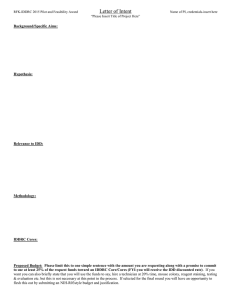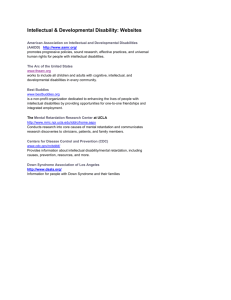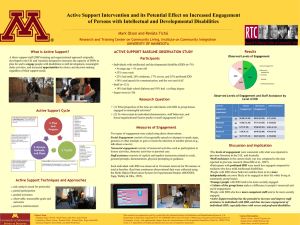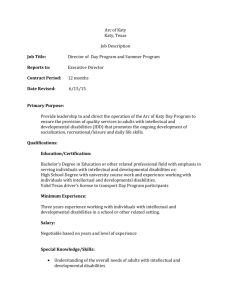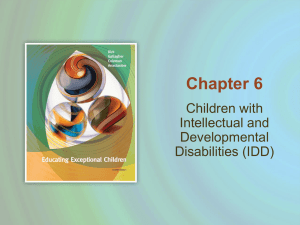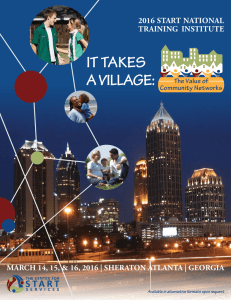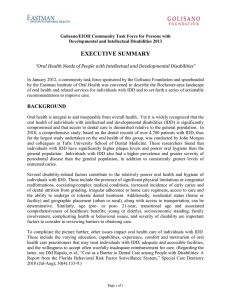Template_48x96
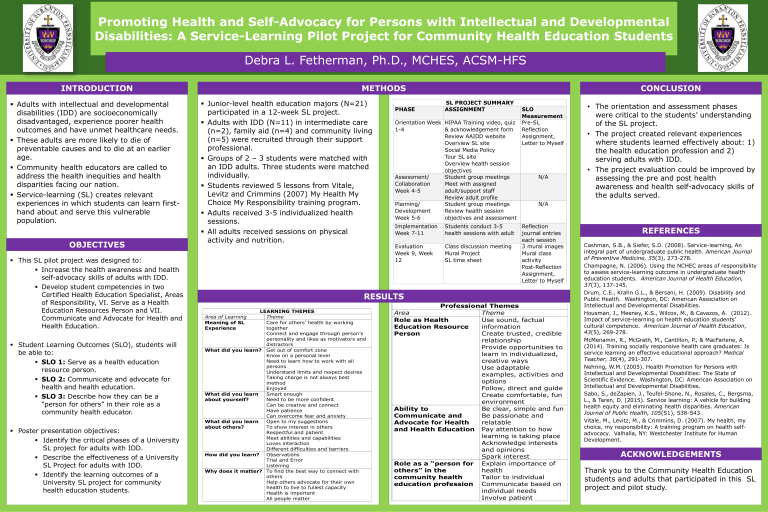
Promoting Health and Self-Advocacy for Persons with Intellectual and Developmental
Disabilities: A Service-Learning Pilot Project for Community Health Education Students
Debra L. Fetherman, Ph.D., MCHES, ACSM-HFS
INTRODUCTION
Adults with intellectual and developmental disabilities (IDD) are socioeconomically disadvantaged, experience poorer health outcomes and have unmet healthcare needs.
These adults are more likely to die of preventable causes and to die at an earlier age.
Community health educators are called to address the health inequities and health disparities facing our nation.
Service-learning (SL) creates relevant experiences in which students can learn firsthand about and serve this vulnerable population.
OBJECTIVES
This SL pilot project was designed to:
Increase the health awareness and health self-advocacy skills of adults with IDD.
Develop student competencies in two
Certified Health Education Specialist, Areas of Responsibility, VI. Serve as a Health
Education Resources Person and VII.
Communicate and Advocate for Health and
Health Education.
Student Learning Outcomes (SLO), students will be able to:
SLO 1: Serve as a health education resource person.
SLO 2: Communicate and advocate for health and health education.
SLO 3: Describe how they can be a
“person for others” in their role as a community health educator.
Poster presentation objectives:
Identify the critical phases of a University
SL project for adults with IDD.
Describe the effectiveness of a University
SL Project for adults with IDD.
Identify the learning outcomes of a
University SL project for community health education students.
METHODS
Junior-level health education majors (N=21) participated in a 12-week SL project.
Adults with IDD (N=11) in intermediate care
(n=2), family aid (n=4) and community living
(n=5) were recruited through their support professional.
Groups of 2 – 3 students were matched with an IDD adults. Three students were matched individually.
Students reviewed 5 lessons from Vitale,
Levitz and Crimmins (2007) My Health My
Choice My Responsibility training program.
Adults received 3-5 individualized health sessions.
All adults received sessions on physical activity and nutrition.
PHASE
Orientation Week
1-4
Assessment/
Collaboration
Week 4-5
Planning/
Development
Week 5-6
HIPAA Training video, quiz
& acknowledgement form
Review AAIDD website
Overview SL site
Social Media Policy
Tour SL site
Overview health session objectives
Student group meetings
Meet with assigned adult/support staff
Review adult profile
Student group meetings
Review health session objectives and assessment
Implementation
Week 7-11
Students conduct 3-5 health sessions with adult
Evaluation
Week 9, Week
12
SL PROJECT SUMMARY
ASSIGNMENT
Class discussion meeting
Mural Project
SL time sheet
SLO
Measurement
Pre-SL
Reflection
Assignment,
Letter to Myself
N/A
N/A
Reflection journal entries each session
3 mural images
Mural class activity
Post-Reflection
Assignment,
Letter to Myself
Area of Learning
Meaning of SL
Experience
LEARNING THEMES
Theme
Care for others’ health by working together
Connect and engage through person’s personality and likes as motivators and distractors
What did you learn? Get out of comfort zone
Know on a personal level
Need to learn how to work with all persons
Understand limits and respect desires
Taking charge is not always best method
What did you learn about yourself?
What did you learn about others?
Enjoyed
Smart enough
Need to be more confident
Can be creative and connect
Have patience
Can overcome fear and anxiety
Open to my suggestions
To show interest in others
Respectful and patient
Meet abilities and capabilities
Loves interaction
Different difficulties and barriers
How did you learn? Observations
Trial and Error
Listening
Why does it matter? To find the best way to connect with others
Help others advocate for their own health to live to fullest capacity
Health is important
All people matter
RESULTS
Area
Professional Themes
Theme
Role as Health
Education Resource
Person
Use sound, factual information
Create trusted, credible relationship
Provide opportunities to learn in individualized, creative ways
Use adaptable examples, activities and options
Follow, direct and guide
Create comfortable, fun environment
Ability to
Communicate and
Advocate for Health and Health Education
Role as a “person for others” in the community health education profession
Be clear, simple and fun
Be passionate and relatable
Pay attention to how learning is taking place
Acknowledge interests and opinions
Spark interest
Explain importance of health
Tailor to individual
Communicate based on individual needs
Involve patient
CONCLUSION
• The orientation and assessment phases were critical to the students’ understanding of the SL project.
• The project created relevant experiences where students learned effectively about: 1) the health education profession and 2) serving adults with IDD.
• The project evaluation could be improved by assessing the pre and post health awareness and health self-advocacy skills of the adults served.
REFERENCES
Cashman, S.B., & Siefer, S.D. (2008). Service-learning, An integral part of undergraduate public health. American Journal
of Preventive Medicine, 35(3), 273-278.
Champagne, N. (2006). Using the NCHEC areas of responsibility to assess service-learning outcome in undergraduate health education students. American Journal of Health Education,
37(3), 137-145.
Drum, C.E., Krahn G.L., & Bersani, H. (2009). Disability and
Public Health. Washington, DC: American Association on
Intellectual and Developmental Disabilities.
Housman, J., Meeney, K.S., Wilcox, M., & Cavazos, A. (2012).
Impact of service-learning on health education students’ cultural competence. American Journal of Health Education,
43(5), 269-278.
McMenamin, R., McGrath, M., Cantillon, P., & MacFarlene, A.
(2014). Training socially responsive health care graduates: Is service learning an effective educational approach? Medical
Teacher, 36(4), 291-307.
Nehring, W.M. (2005). Health Promotion for Persons with
Intellectual and Developmental Disabilities: The State of
Scientific Evidence. Washington, DC: American Association on
Intellectual and Developmental Disabilities.
Sabo, S., deZapien, J., Teufel-Shone, N., Rosales, C., Bergsma,
L., & Taren, D. (2015). Service learning: A vehicle for building health equity and eliminating health disparities. American
Journal of Public Health, 105(S1), S38-S43.
Vitale, M., Levitz, M., & Crimmins, D. (2007). My health, my choice, my responsibility: A training program on health selfadvocacy. Valhalla, NY: Westchester Institute for Human
Development.
ACKNOWLEDGEMENTS
Thank you to the Community Health Education students and adults that participated in this SL project and pilot study.
